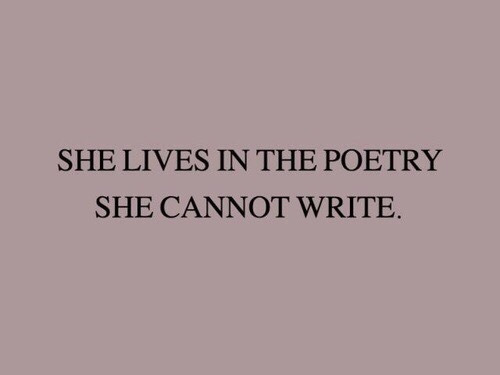readingwords
9 posts
17 || he/him || gay af || studyblr || bookblr || langblr: swedish & polish || writer
Don't wanna be here? Send us removal request.
Photo

“The secret of getting ahead is getting started.” – Mark Twain
“Do not wait to strike till the iron is hot; but make it hot by striking.” – William Butler Yeats
“It always seems impossible until it’s done.” – Nelson Mandela
“The best way for you to predict your future is to create it.” – Abraham Lincoln
“It does not matter how slowly you go as long as you do not stop.” – Confucius
“Our greatest weakness lies in giving up. The certain way to succeed is always to try just one more time.” – Thomas Edison
“Don’t watch the clock; do what it does. Keep going.” – Sam Levenson
“What you get by achieving your goals is not as important as what you become by achieving your goals.” – Zig Ziglar
“By failing to prepare, you are preparing to fail.” – Benjamin Franklin
“I am not afraid…I was born to do this.” – Joan of Arc
“The most effective way to do it, is to do it.” – Amelia Earhart
“We aim above the mark to hit the mark.” – Ralph Waldo Emerson
“Optimism is the faith that leads to achievement. Nothing can be done without hope and confidence.” – Helen Keller
“The way to get started is to quit talking and begin doing.“ – Walt Disney
“Consult not your fears but your hopes and your dreams. Think not about your frustrations, but about your unfulfilled potential. Concern yourself not with what you tried and failed in, but with what it is still possible for you to do.” – Pope John XXIII
“Start where you are. Use what you have. Do what you can.” – Arthur Ashe
“When you reach the end of your rope, tie a knot in it and hang on.” – Franklin D. Roosevelt
“What you do today can improve all your tomorrows.” – Ralph Marston
“Perserverance is failing 19 times and succeeding the 20th.” – Julie Andrews
“The harder the conflict, the more glorious the triumph.” – Thomas Paine
“I attribute my success to this–I never gave or took any excuse.” – Florence Nightingale
“Knowing is not enough; we must apply. Willing is not enough; we must do.” – Johann Wolfgang van Goethe
“Who seeks shall find.” – Sophocles
“Change your life today. Don’t gamble on the future, act now, without delay.” – Simone de Beauvoir
Motivational Quotes Part 2 | Inspirational Quotes
12K notes
·
View notes
Text
Taking book recommendations ✨
My goal for 2020 is to read 200 books. Yes, I know, it's crazy. But, if I want it to work out, I really need some recommendations on what I should read.
So, drop your favourite book(s) so I can check them out 🌻 Classics, adult books, poems and other shorter books, historical books or anything you like ✨
11 notes
·
View notes
Text



28/12/2019
I went to walk this morning to the beach, I was fun, although all my other pictures got corrupted, who knows why. Also did some Polish practice after so long time, I definitely have forgotten everything. Then I did some math notes that I really need to catch up on.
But now I am just going to relax and continue writing an idea I got yesterday, new writing projects are always exciting ^^
4 notes
·
View notes
Text
If you post something emotional or a vent post and I 'like' the post that's me putting my arm around ur shoulder telling you it's all gonna be ok
36K notes
·
View notes
Text
tbh life’s too short to be embarrassed by little things ??? wear that outfit ur mom said was ugly & laugh ur natural too loud laugh & talk to intimidating people u find interesting !!! join cringy clubs & read books everyone hates & wear too much eyeliner !!! if shit doesn’t work out who cares !!! people who are worth being around will stick by u anyway !!!
154K notes
·
View notes
Text
Lately, I’ve been seeing something slightly bothersome around studyblr, and I just want to say something about it. Basically, there seems to be this attitude cropping up (or at least that I’ve seen/heard about more frequently these days) that your grades reflect your level of effort, or that by simply working hard and putting more effort in, your grades will automatically improve. I disagree.
Yes, there are certainly some cases where you’re already proficient in a class and if you just put in the extra time to study, you’d do better. But there are some classes where grades are not a measure of the level of effort you put in, and therein lies my biggest issue with the grading system and these types of studyblr posts in general. This was certainly the case with me in honors physics (so bear with me, because I have a very large point to make with the following anecdote).
Personally, I’ve always had “easy A” classes where I don’t have to work hard; my brain and academic strengths simply favor me in that particular subject, so with minimal effort I can still be top in the class. And then I see peers who go in for tutoring every day, who spend hours studying and meeting with teachers, who basically invest 100 times the effort I do… and still can’t get above a B or C.
This is not to mention people who take classes that are “reaches” and, accordingly, don’t do so well – even though they work hard – because it’s a challenge. Then there are those who take lower level classes but have capabilities beyond that – and don’t need to put effort in – thus giving them an unfairly easy A. Does their A mean that they work harder? That they’re a better student, studier, scholar, intellectual? Hell to the no.
English is one of those “easy A” classes for me. I’m just innately strong in verbal-linguistic intelligence (going off of Gardner’s theory of multiple intelligences), so I’ve literally never had to study for English tests or reading comp/writing. But put me in other classes, particularly science classes? Well, that’s something else entirely.
Which brings me to junior year honors physics.
Guys, I studied my ASS off, for hours at a time. I desperately Skyped people in my class nearly every night to try to understand the homework and spent every lunch block trying to master the material. I met with my physics teacher and tutor all the time and had a dozen anxiety attacks (and I mean actual, diagnosed anxiety attacks) over that one class because I tried harder than I’ve ever tried… and I got a B for the whole year. I was the one who dreaded seeing that red number scrawled on my test, who shoved it into my backpack before others could see and blinked back tears, thinking, But I studied so hard!
Physics was a nightmare I was desperate to forget by the end of junior year. But then a couple things happened that shocked me, and I instantly thought of them when I read some of these posts about good effort = good grades.
Now, my physics teacher, who has a reputation for being on the strict side and being a tough grader, has had four teaching assistants (TAs) in five years of teaching. Most science teachers at my school have as many as five a year. At the end of 11th grade, after I’d scraped by with a B in his class, he asked me if I wanted to be a TA. Out of the entire grade – out of the multitude of students I’d watched parade past with straight A’s and “that test was so easy” and “I barely studied” and “sorry Edye I don’t know how else to explain it to you” – he chose me.
I think I (very graciously) blurted out, “What? Why?” because I was so taken aback. He said that I was hardworking and dedicated – that I’d always gone above and beyond in my studying and meeting with him – and he wanted someone like me to be a TA. I was flattered, and I thoroughly enjoyed being a TA during senior year. (Also, anyone who doesn’t think he’s super nice is incredibly wrong. He’s awesome.)
Two years later, I got to read his college recommendation for me. Bear in mind that I was not, based on my grades, a top student in his class. And this is what he wrote for his opening line:
Honors Physics is a rigorous course that draws from the strongest students in the junior class and Edye proved to be one of those students.
What? He had seen my report card, right? I got worse grades than all of my friends. I got a goddamn 66 on a test in that class, my all time low. He continued:
One of the many examples of Edye’s commitment [is when she] had been ill and missed quite a bit of school and consequently had a lot of school work to make up in all of her classes. Many students in this situation would take one or more classes pass / fail for the quarter; Edye would not take the pass/fail option and insisted she complete all the work and complete it with the grade she would earn. She did in fact complete all of the work and with a B-. A remarkable accomplishment considering she kept current with her studies while making up all of the missed work.
He called a B-minus “a remarkable accomplishment.” Did he say “too bad she didn’t put enough effort in, which was reflected in a B-minus” or “she only got a B-minus, so I guess she didn’t try hard enough”? No, he praised the amount of effort I put in, even though I didn’t even get a “good” grade.
I’m hardly one to knock putting in effort, but what bothers me is that this attitude, that effort = good grades, has the potential to make people feel bad. To feel like if they aren’t acing a class even though they’re studying harder than anybody else, well, they just aren’t trying hard enough. Yes, grades are important. So is effort. But they are not always directly correlated. As is evidenced by my story, sometimes people who get lower grades have worked even harder then those who got high grades. And, if they’re lucky, this will be acknowledged. (I can certainly attest that while I’ve been praised by English teachers for my writing skills and intellect, they’ve never singled me out for putting in an exceptional amount of effort. They know that while I’m proactive and responsible, I don’t try super hard because, well, I don’t really need to in order to get a good grade.)
Encourage other students to put in a reasonable amount of effort; recommend different study methods. But don’t tell them that good effort = good grades. Teach them to measure their success by looking at how productive they’re being, how proactive they are in reaching out for help, how dedicated they are to their education, how resilient they are in the face of obstacles, how committed they are to school. Admire those who refuse to take the easy way out, even if they only get a C. These qualities, which are far more important than a 4.0, just don’t always translate directly into good grades.
I dislike seeing this message all over Tumblr, that to get better grades you just have to try harder – which carries with it the implication that if you don’t get good grades, it’s because you aren’t putting enough effort in – when I know from firsthand experience that this is not always true. I strongly believe in trying to be the best student you can be, rather than trying to be in the top 5%. But in the end, do what works for you. Just take it with a grain of salt.
And to my followers, and anyone reading this… please know that, if you work hard regardless of your grades, you are already a model student, and you are absolutely someone I look up to.
6K notes
·
View notes
Text
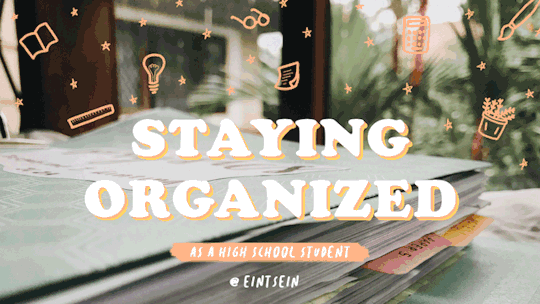
Hey guys, so I’m nearing the end of my senior year, and it’s been great so far! I accomplished my academic tasks efficiently and didn’t burn myself out, and I think the main contributor to my success as a student is my organization system. This system has been refined throughout my high school years, but I think now I’ve finally found the most effective methods.
Please remember that this isn’t the only organization system you can adopt; this is just the one that works the best for me, and I hope that by sharing it with you, you’ll gain a new perspective on how to stay organized as a high school student.

The first thing I wanna talk about is my notebook system, which I briefly mentioned in my Guide to Note-Taking.
My notebook system comprises three types of notebooks: the Everything Notebook, the subject notebook, and the revision notebook.
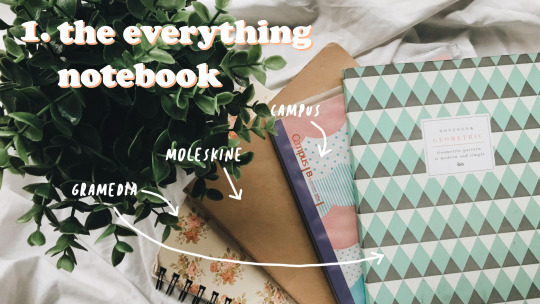
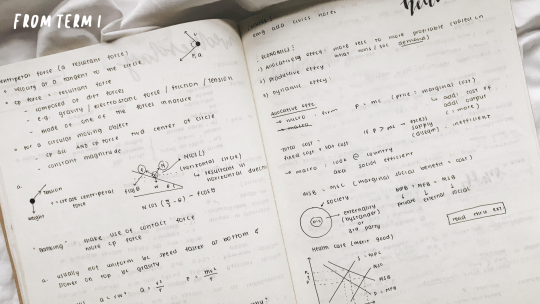
The Everything Notebook
The first stage is in-class notes. I only bring one notebook to school every day. I call it my Everything Notebook, and this is where I write down all of the notes I take in class. This way, I don’t have to lug around six notebooks where I’m only going to use a few pages in each of them that day.
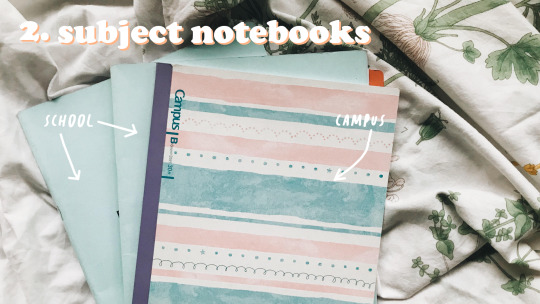
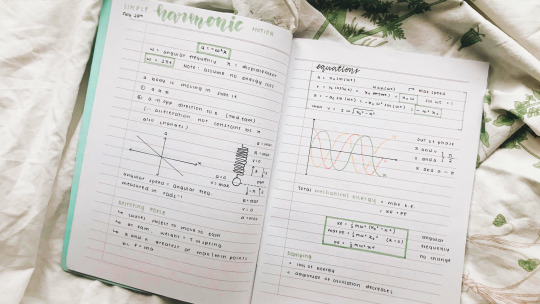
Subject Notebooks
At the end of the day, I would revise my notes and compare them to the syllabus so I know where we are in the learning process. I would then transfer my class notes from my Everything Notebook to my different subject notebooks. This is stage two. I also start to jazz up my notes because I use the notes in my subject notebooks to study for tests.
In addition to my class notes, I include material from my teachers’ notes that they might not have elaborated on, as well as points in the syllabus (I’m currently taking A2) that were only glazed over briefly, or not at all, in some cases. (Note: this does not mean they completely skip a chapter or topic; it’s more like they missed a few bullet points that should be in my notes but aren’t. An example would be if we’re learning about phenol reactions and the teacher forgot to mention the use of FeCl3 as a test for phenol.)
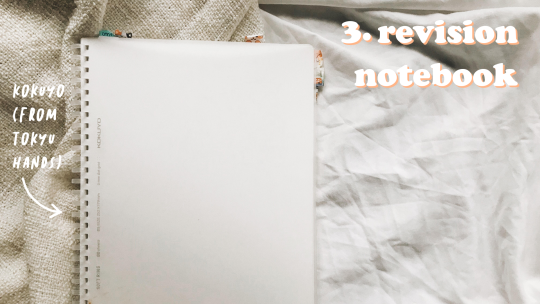
Revision Notebooks
Stage three comes a little later, when exam week is just around the corner. Essentially, I rewrite and improve my notes from my five different subject notebooks into a single revision notebook or binder. (Recently, I’ve opted for a revision notebook because they’re lighter and easier to carry around.)

Because my teachers don’t always teach in the order of the syllabus, the first thing I do is organize my notes according to the syllabus. I would then fill in any other missing gaps in the material that hadn’t been filled in stage two.
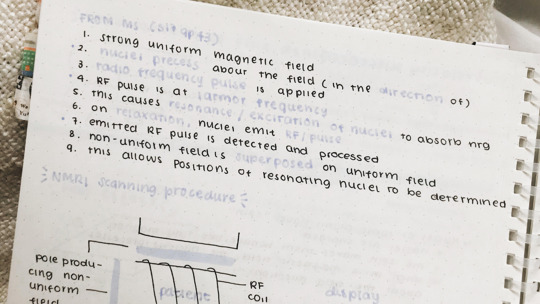
When compiling material for my revision notebook, I use as many sources as possible: my own notes, my teachers’ notes, youtube videos, online sites, and my favorite, the mark scheme! I add in some answers from past papers (explanations only, so no calculations) mainly to secure marks. It’s safer to memorize definitions straight from the mark scheme than from the textbook or from handouts. I also do this to ease my memorization, especially for topics that require lengthy explanations. It’s a lot easier to remember the 6 points I need to explain the principles of NMRI than to remember everything in the four-page handout my teacher gave me.

Folders and binders are essential to organizing your papers. Some people keep a single accordion folder for all their papers, but for me it’s just too heavy to carry around all the time. The same goes for subject folders that are brought to school every day.
Instead, my binder/folder system comprises my Everything Folder and my subject binders.
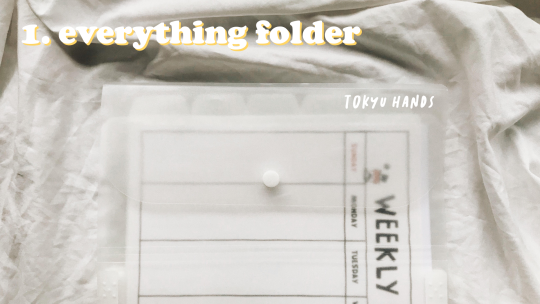
The Everything Folder
The folder I carry with me to school every day is this A4 folder I got from Tokyu Hands. It has 5 pockets, one for each day of the week, so all the papers I receive on Monday will go behind the first divider, and so on.
Some people also keep blank papers in their folders; I don’t because my school has its own lined paper and graphing pads that I keep under my desk that I use if a teacher asks us to do an assignment on those papers. If I do work at home, I prefer to just use a plain A4 paper or a legal pad.
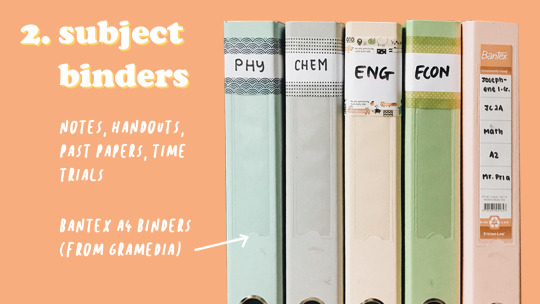
Subject Binders
At the end of the week, I’ll sort my papers into my subject binders. Sometimes I’ll keep some papers in the folder if I think I’ll be needing it the next week. This usually only applies to worksheets because all my teachers’ notes are available on Google Classroom, so I can access them even if I don’t physically have them.
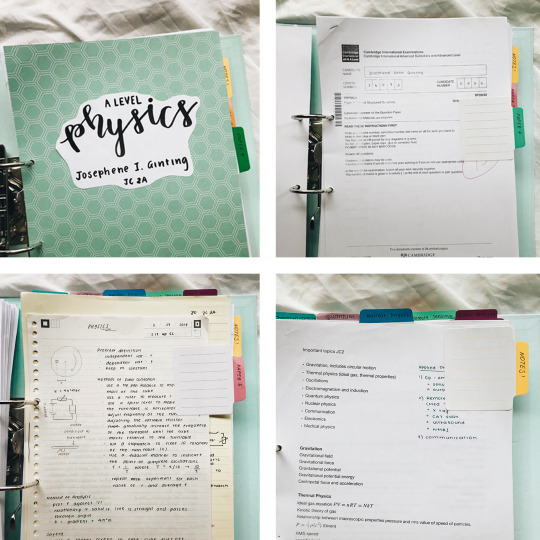
Each of these binders have sections inside them:
Physics: 1 for handouts, notes, and tests, 1 for Paper 4 (Theory), 1 for Paper 5 (Practical Planning). I included extra tabs to mark the different topics in the handouts section.
Chemistry: same as Physics.
Economics: 1 for Paper 3 (MCQ), 1 for Paper 4 (Case Study and Essay). A lot of my Economics material is online, though.
English: 1 for Paper 3 (Text and Discourse analysis), and 2 for Paper 4 (Language Topics, which includes 1 for Child Language Acquisition, 1 for World Englishes). Past papers, handouts, and notes all go under their respective topics.
Mathematics: I just keep everything together because I never revise math and just constantly do past papers.
This makes it easier for me to revise each subject because I can just take one binder with me instead of a messy folder with everything just shoved in there.

I keep a magazine file for each of my A-Level subjects (English and Mathematics are combined). All my textbooks, revision guides, and subject notebooks are kept here, so if I need to revise one subject, that’s the magazine file I’ll take out.

These magazine files prevent any small things (like my book of flashcards) from being shoved to the back of my bookshelf, or materials from different subjects from getting mixed up.

In my senior year, I mostly plan using this app called Edo Agenda. It syncs across all my devices for free and has all the features I need: a to do list to organize tasks, monthly and weekly calendars to organize events, a journal to organize notes and memos.

I used to bullet journal regularly, but it takes too much time during weekdays, so now I just bullet journal for the therapeutic effects it gives me, and I use an app for organizing tasks and events. Sometimes at the end of each week, I’ll transfer my tasks to my bullet journal and then decorate the page, but again, this is just for its therapy.

Organizing your school supplies is just as important as organizing your papers and notes. With a more organized backpack and pencil case, you won’t waste time looking for your things at the bottom of an abyss.
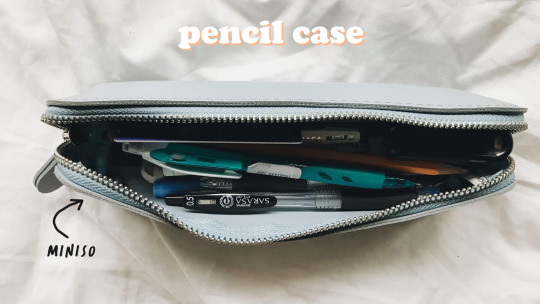
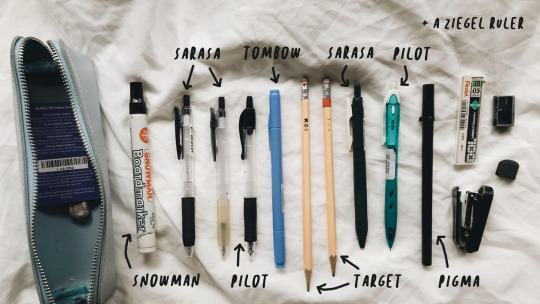
Pencil Case
I don’t find it necessary to bring so much stationery to school unless I plan on making notes at school (usually during revision week).
Backpack
Because we’re already in the revision term, I don’t really carry a lot of things in my everyday backpack, just the following:
Pencil case
Everything Notebook
Everything Folder
Revision notebook
Kindle
Phone
Wallet
Earphones
Calculator
Speaker
Drinking bottle
A pouch with things like a hairbrush, pads, and lip balm
And that’s all for now! I hope this post will help you organize your school life (if you haven’t already) or at least provide some useful insights on some ways to stay organized as a high school student.
45K notes
·
View notes
Text

24.12.2019
Merry Christmas everybody! 🎄🎁 Remember to take a break and spend time with your loved ones! Also make time for yourself ⛄
- M 🌱
5 notes
·
View notes
